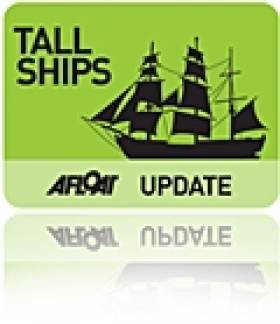Displaying items by tag: Brigantine Asgard II
Small Yet Smart Brigantine Sets Sails Across the Irish Sea
#Tallships- The Sea Cadet's training tallship TS Royalist this morning departed Dun Laoghaire Harbour under the command of Skipper Angela Morris, following an overnight visit after setting off from Milford Haven in Pembrokeshire, writes Jehan Ashmore.
Royalist may be small with only 29m in length and on a beam of just over 6m, yet with her smart distinct black and white hull band colours she is easily recognisable wherever she visits ports and harbours throughout the UK.
Her 8-strong crew and 24 sea cadets are on a voyage bound for Oban, Scotland, with an en route call to Belfast so in order to exchange a new cadet crew.
Throughout her career Royalist has visited Irish ports and in recent years she has participated in the Tall Ship Races to include Waterford City in 2011 and also back in 2006 where the Asgard II, also a brigantine and of similar size led to both crews having shared a competitive yet equally friendly relationship.
This was to be Asgard II's final Irish Tall Ships Race before she sank off the Breton coast and in what will be her fifth year since the incident took place in September 2008.
The UK flagged brigantine however dates to decade earlier having been completed in 1971 though at this stage the flagship is nearing the end of her career with the Sea Cadets which has helped countless young people to experience sailing throughout the UK. The origins of the Sea Cadets date to 1856 where young given instructions on a naval theme.
Present-day activities of the Sea Cadets involve 14,000 young people based in 400 units throughout towns, cities and ports in the UK. The cadets are presented challenges while also developing new skills, like sailing, boating and even rock climbing. All this work is provided with the support of 9,000 volunteers.
Sea cadets age between 10-17 years old and they are divided into the following age groups- Junior cadets (10-12), Sea Cadets(12 -17) and the Royal Marines Cadets ranging between 13-17 respectively.
Royalist is nearing the end of her career and funds are required to build a slightly larger replacement with the Sea Cadets launching a new ship appeal campaign, so that future generations can continue the chance to sail at sea until the mid-21st century.
























































